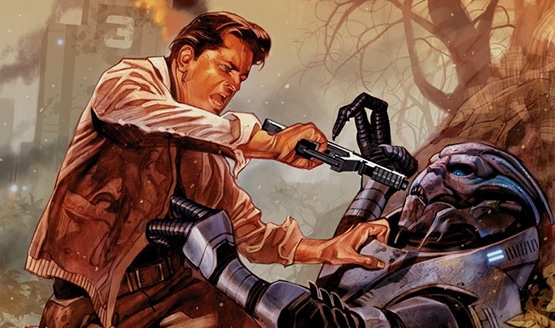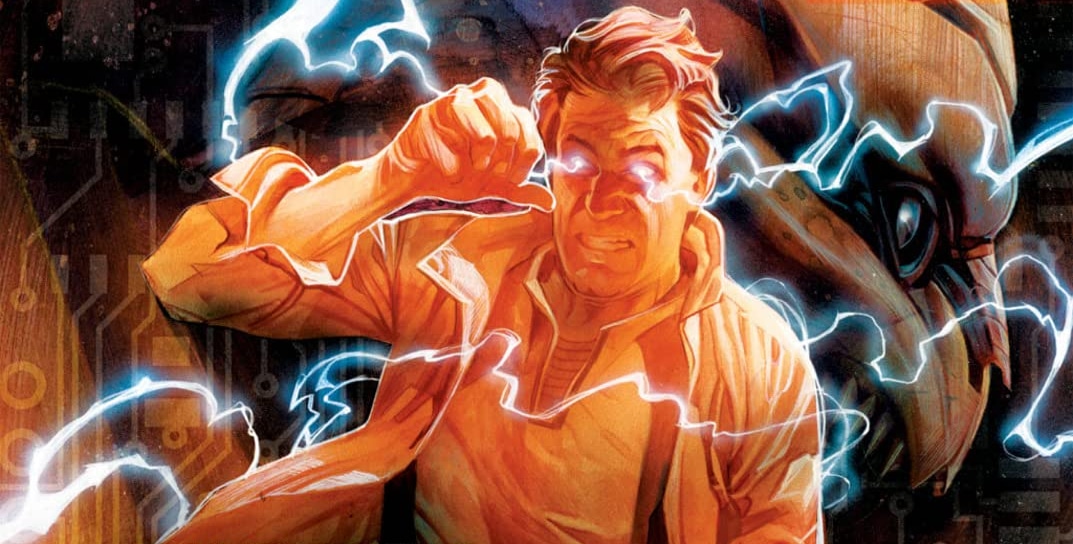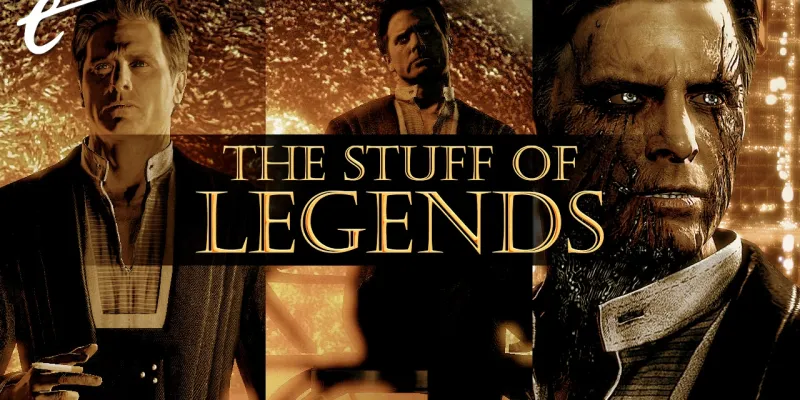Who is the Illusive Man, really? Despite being a constant fixture for much of the Mass Effect trilogy, many fans don’t even know his real name. What led to the mysterious mastermind founding the paramilitary pro-human terrorist group known as Cerberus? And what connections does he have with Mass Effect’s other most iconic sapient villain?
As first detailed in Mass Effect: Evolution, the future wannabe galaxy savior Illusive Man started out as a much simpler young man. In fact, he was a bold hero not unlike Commander Shepard, leading the charge during the First Contact War between humanity’s Systems Alliance and the Turian Hierarchy. Born Jack Harper, all he hoped for was to stop the turian advance on Alliance colonies, by any means necessary. Though the conflict has only been depicted briefly, he was already a natural leader in his relative youth, joined by a team of volunteer human operatives who disrupted turian operations. They proved capable enough to hold sway with the Alliance brass despite not being an official unit in the Alliance navy. But all that changed towards the end of the war on the world Shanxi.
Jack Harper and the turian general Desolas Arterius chance upon an ancient Reaper conversion device while fighting. Neither realizes what they’re truly dealing with, which comes at the cost of Jack’s second in command Ben Hislop, who dies as he’s converted into a husk. Ben takes the brunt of a blast, though Jack is hit with enough that he gains his iconic blue gaze, his irises turned synthetic by the Reaper artifact. In the aftermath, before being handed over to the Alliance, Jack has his first of several encounters with none other than Desolas’ far more famous brother, the future Spectre Saren.

In a fascinating turn, we get to see Saren before his descent into villainy. Together, the pair come to realize there’s something very wrong with the artifact, made all the more troubling by Desolas’ worship of it. Worse still, a similar artifact resides on the turian homeworld of Palaven, which Desolas drags Jack’s team and Saren to without a hint of concern.
Desolas sees the Reaper conversion as a way to craft the perfect soldiers, believing he’s harnessing ancient tools of turian mystics of old. As this plays out, Saren and Jack both come to realize that in fact turian mythology is in worship of something far more ominous than previously believed. Their so-called mystics are indoctrinating all turians that come into contact with the device, creating an army that will threaten Palaven rather than strengthen it.
It’s in this terrifying prospect of an early wave of Reaper indoctrination that both Saren and Jack unite as allies, opposing Desolas’ blind belief in a desperate bid to destroy the monoliths. Each can see the danger these ancient machines present, molding their intentions going forward. In Jack’s case, he loses not only the resurrected Ben to the influence of the Reapers but the rest of his team, and Saren must sacrifice his brother, turning colder as he decimates the temple.
Unfortunately, Jack and Saren come away with two equally problematic perspectives from their brush with the ancient Reaper tech. Jack particularly has a renewed sense of vigor and purpose in how humanity must strengthen and prepare for a coming war, echoing Desolas’ sentiments, his own far subtler indoctrination taking hold.

With both of his closest friends dead, Jack’s heart is hardened to justify the choices he’s made. His manifesto written and cast out into the universe, he opens a call that will birth Cerberus from the deep reaches of space, himself born anew as the Illusive Man. Already a master at paramilitary tactics, sabotage, and stealth, it’s as if the First Contact War never truly ends in his mind. Meanwhile, Saren’s fear sends him spiraling into the events of Mass Effect: Revelation and the first game, realizing there is a greater mystery to tease apart. They each come so close to being the savior the galaxy needs, only to fall short, while Commander Shepard will rise to the occasion.
What’s particularly great about this origin story is how both the Illusive Man and Saren are depicted as the ultimate villains and paragons of their respective species. Each captures the most iconic traits, whether the hot-headed, scrappy, unpredictable underdog that rises to the moment or the cold and calculating tactician willing to do whatever is necessary to maintain order to protect the greater whole.
Each has a clear arc looming, leading to their villainous conclusions, but you can see why other characters are drawn to them. They have an enigmatic air despite the red flags each clearly waves through their actions. Though most of Evolution’s cast is a bit half-baked, it’s clear a sacrifice was made to focus on these two iconic characters.
The Illusive Man’s influence is spread wide across the Mass Effect expanded universe, appearing in many of the comics and all but one of the original trilogy’s tie-in novels (yes, even that one). Besides David Anderson, Saren, and Shepard, Jack Harper might just be one of the most integral characters of the Mass Effect mythos. So if you’re dying to enjoy more of the cyborg mastermind, there’s plenty to uncover. He may be a truly Illusive Man, but Jack Harper has certainly left his mark.
